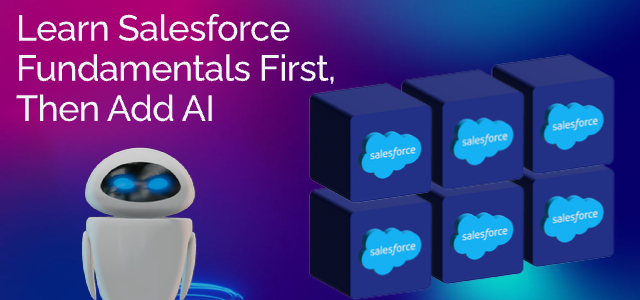Learn Salesforce Fundamentals First, Then Add AI
Estimated reading time: 6 minutes
In the chaos of digital change, businesses can hardly resist the temptation of Artificial Intelligence (AI). From predictive analytics to personalized customer experience, the ways AI can help raise the bottom line are endless. Salesforce®, the leading CRM platform, has embraced AI with many innovations. But before businesses rush headlong into the AI wave, ensuring the right foundational Salesforce building blocks are set in place is essential. Otherwise, AI can quickly turn from an asset into more of a liability than anything else.
In the Ad Victoriam Salesforce Blog, we’ll discuss why solid Salesforce fundamentals are so key, highlight several areas of focus, and review how to set your business up for success before bringing AI into the mix.
The Rush to AI
It’s easy to see why businesses would rush to implement AI technologies. In fact, according to a recent Genesys survey, 83% of CX leaders believe that AI is going to be a clear differentiator for them in the future. And 59% say AI adoption in customer experience delivers increased customer loyalty and lifetime value. Companies leveraging AI can process data faster, automate time-consuming tasks, and deliver real-time insights. AI-enabled software can streamline sales, tailor marketing, and improve customer support, making it an attractive offering for businesses looking to gain an edge over the competition.
Of course, these AI-enabled advantages can be so enticing; however, not every business is an AI-ready business. For AI to function at its best, it needs good data and streamlined processes, and solid Salesforce building blocks are essential.
The Importance of Solid Salesforce Fundamentals
At its core, Salesforce helps a company centralize data management, streamline processes, and empower better ways to keep customers engaged with the companies. However, for such full potential of AI to be brought into play, every firm has to begin with a sound foundation. Before an organization embarks on AI, certain foundational building blocks have to be in place, namely:
- Clean and Organized Data
AI tools are only as good as the data they rely on. Poor data quality is one of the major causes of failure in deploying AI initiatives. According to a report by Anodot, bad data costs the U.S. economy roughly $3.1 trillion per year. Unless accurate, timely, and well-organized, data provided to AI models will be incomplete or inaccurate in their insights, which may result in a bad decision.
One of Salesforce’s biggest strengths is the centralization of customer data and organization. Every business should audit its data quite frequently to ensure that it is complete, clean, and pertinent to whatever AI model they’re looking to use. Several data enrichment tools in Salesforce, such as Data Cloud, will help standardize and improve the quality of customer information.
- Efficient Workflows and Automation
Integration of AI demands that companies first ensure that they are tapping into all Salesforce automation. For example, the workflows of Salesforce may be exploited to help automate simple tasks like an action being performed on a given set of conditions or routing information to the appropriate teams or people. This avoids bottlenecks and creates an effective free flow of data within the organization, which would not otherwise be achieved by AI.
With these workflows in place, businesses can then go deeper into even more process automation such as with Flow Builder to automate more complex tasks. AI fits into those existing automation and enhances the efficiency of processes.
- Customer Journey Defined
AI performs best when it has defined goals and well-defined processes to work within. First and foremost, for a business to effectively adopt and implement AI tools, it needs to map out the customer journey on Salesforce. This includes understanding the key touchpoints customers go through, understanding the pain points in these interactions, and finally making sure that customer data flows freely between sales, marketing, and service teams.
The capability to create automated, personalized customer journeys through Journey Builder-Salesforce tools enables businesses to get insight and understanding about the customer journey and give documentation within Salesforce on how better the AI tool will be implemented to help provide insights and recommend actions at every stage of the customer lifecycle.
- Scalability and Flexibility
Another important building block is the scalability and flexibility of your Salesforce instance to adapt to newer AI technologies. With various tools that can be customized for wide-ranging business needs, Salesforce allows for running big businesses through many applications. Through the AppExchange and APIs, companies can deploy third-party applications for analytics, and data management, which could also become part of AI deployments.
A flexible Salesforce architecture ensures easier integration of AI tools and features without tearing down incumbent systems. It should, for instance, feel like a natural extension of Salesforce’s Agentforce™ is implemented on top of an incumbent platform, not some kind of disruption.
Why Strong Salesforce Foundations Matter: Key Stats
The importance of having the aforementioned Salesforce building blocks in place before adding AI is underscored by key industry statistics:
- Poor data quality, incomplete adoption of features within CRM, and reasons account for the failure of 70% of the projects done in CRM. Ensuring clean and structured data and leveraging core Salesforce capabilities fully form the foundation to achieve success in AI. (Garner)
- 89% of companies that have adopted AI claim that it is improving their decision-making process only when integrated into an organized and adaptive CRM system. (The HR Director)
Summary
While AI indeed promises a more enhanced capability and personalized experience with customers, without a solid foundation, it cannot be implemented very well. It’s all about setting up the right foundation of clean data, optimized workflows, mapped customer journeys, and a flexible Salesforce system that makes sure AI will drive maximum value for your business.
In the race to adopt AI, don’t forget the basics. With the right Salesforce building blocks in place, AI will be able to seamlessly enhance your operations, deliver insight, and ultimately provide a competitive advantage to drive growth and success.
How AdVic Can Help
Businesses must carefully consider the challenges associated with AI and GenAI before implementing these technologies. But do not worry—AdVic’s Team is well-equipped to design your personalized AI roadmap to success. Our Salesforce-certified consultants are also ready to help your business implement the new Agentforce tool, ensuring a seamless integration tailored to your unique needs. If you have any questions or are ready to start today, book a meeting with us now.
Related Resources:
Harness the Power of Data with Salesforce Analytics Cloud & GPT-Powered Tools
Salesforce Introduces Generative AI Tools for Marketers
Decoding Salesforce: Unveiling the Messaging Behind AI+Data+CRM
Why Forecasting Sales with AI is Important Across All Industries
Subscribe to the AdVic Salesforce Blog on Feedly:




